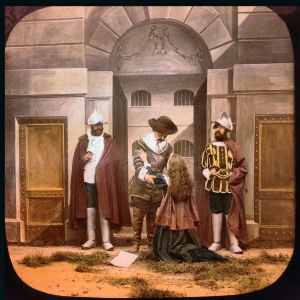|
|
Curfew Must Not Ring Tonight (De avondklok mag vanavond niet luiden) naar een gedicht van Rose Hartwick Thorpe. |
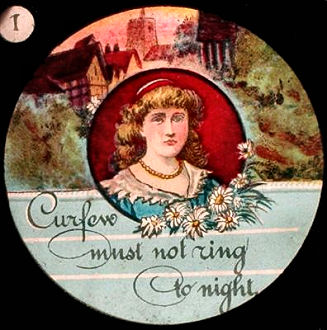
|
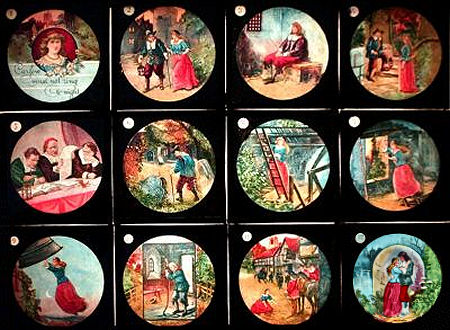 |
||||
|
Curfew Must Not Ring Tonight
is een verhalend gedicht van Rose Hartwick Thorpe (1850-1939) dat werd
geschreven in 1867. Het verteld de droevige geschiedenis van een
jonge, mooie dochter van een houtvester, Bessie, van wie de
minnaar Basil
Underwood gevangen is genomen door de Puriteinen. De rechter
heeft hem veroordeeld te worden doodgeschoten als een spion, die
avond wanneer de avondklok luidt. Omdat zij weet dat Olivier
Cromwell, de Engelse militaire en politieke leider ten tijde van
de Engelse Burgeroorlog, nog laat zal aankomen, vraagt de jonge
vrouw aan de oude koster of hij de avondklok dit keer niet wil
laten luiden. De oude man weigert dit, waarop Bessie heldhaftig
de ladder beklimt naar de top van de klokkentoren, haar leven
hiermee op het spel zettend. Ze slaagt er in met de hand te
voorkomen dat de bel gaat luiden en vertraagt daarmee de
executie. Wanneer Cromwell aankomt en hoort van haar heldhaftig
optreden is hij zo ontroerd dat hij onmiddellijk de vrijlating
van haar vriend gelast. Thorpe baseerde het gedicht op het verhaal 'Love and Loyalty' dat ze vond in een tijdschrift voor vrouwen waar zij een fervent lezer van was. Het werd een van de populairste gedichten van de 19e eeuw en er wordt gezegd dat het een favoriet was van de Engelse koningin Victoria, maar daarna is het in de vergetelheid geraakt. Thorpe noemde het aanvankelijk 'Bessie and the Curfew', maar verwisselde deze saaie titel voor de steeds terugkomende refreinregel 'Curfew Must Not Ring Tonight', waaraan waarschijnlijk de geweldige populariteit te danken is. Er werden drie speelfilms gemaakt gebaseerd op dit gedicht, maar nooit een versie met geluid. |
|||||
| Let op: dit moet door de lantaarnist op een hartroerende wijze gedeclameerd worden: | |||||||
|
Slowly England's sun was setting o'er the hilltops far away, Filling all the land with beauty at the close of one sad day; And its last rays kissed the forehead of a man and maiden fair -- He with steps so slow and weary; she with sunny, floating hair; He with bowed head, sad and thoughtful, she, with lips all cold and white, Struggling to keep back the murmur, "Curfew must not ring tonight!" |
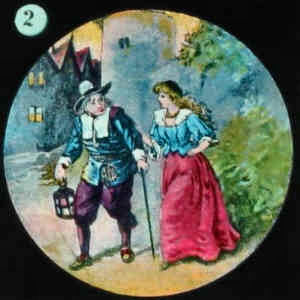 |
||||||
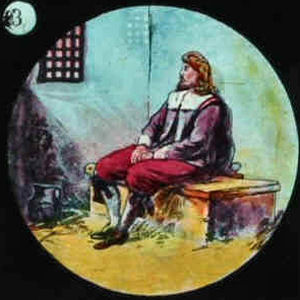 |
"Sexton," Bessie's white
lips faltered, pointing to the prison old, With its walls tall and gloomy, moss-grown walls dark, damp and cold -- "I've a lover in the prison, doomed this very night to die At the ringing of the curfew, and no earthly help is nigh. Cromwell will not come till sunset;" and her lips grew strangely white, As she spoke in husky whispers, "Curfew must not ring tonight!" |
||||||
|
"Bessie," calmly spoke
the sexton (every word pierced her young heart Like a gleaming death-winged arrow, like a deadly poisoned dart), "Long, long years I've rung the curfew from that gloomy, shadowed tower; Every evening, just at sunset, it has tolled the twilight hour. I have done my duty ever, tried to do it just and right: Now I'm old, I will not miss it. Curfew bell must ring tonight!" |
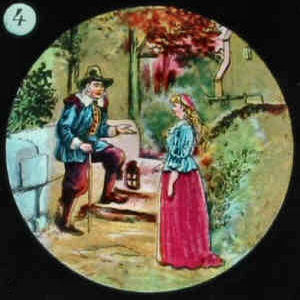 |
||||||
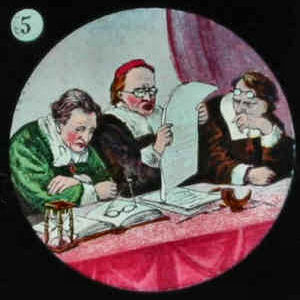 |
Wild her eyes and pale
her features, stern and white her thoughtful brow, As within her secret bosom, Bessie made a solemn vow. She had listened while the judges read, without a tear or sigh, "At the ringing of the curfew, Basil Underwood must die." And her breath came fast and faster, and her eyes grew large and bright; One low murmur, faintly spoken. "Curfew must not ring tonight!" |
||||||
|
She with quick step
bounded forward, sprang within the old church-door, Left the old man coming slowly, paths he'd trod so oft before. Not one moment paused the maiden, But with eye and cheek aglow, Staggered up the gloomy tower, where the bell swung to and fro; As she climbed the slimy ladder, on which fell no ray of light, Upward still, her pale lips saying, "Curfew shall not ring tonight!" |
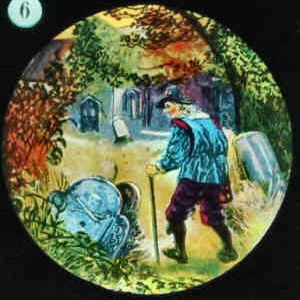 |
||||||
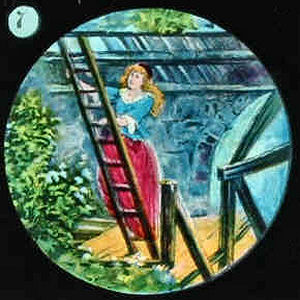 |
She has reached the
topmost ladder, o'er her hangs the great dark bell; Awful is the gloom beneath her, like the pathway down to hell. See! the ponderous tongue is swinging; 'tis the hour of curfew now, And the sight has chilled her bosom, stopped her breath, and paled her brow. Shall she let it ring? No, never! Her eyes flash with sudden light, As she springs, and grasps it firmly: "Curfew shall not ring tonight!" |
||||||
|
Out she swung -- far out.
The city seemed a speck of light below -- There twixt heaven and earth suspended, as the bell swung to and fro. And the sexton at the bell-rope, old and deaf, heard not the bell, Sadly thought that twilight curfew rang young Basil's funeral knell. Still the maiden, clinging firmly, quivering lip and fair face white, Stilled her frightened heart's wild throbbing: "Curfew shall not ring tonight!" |
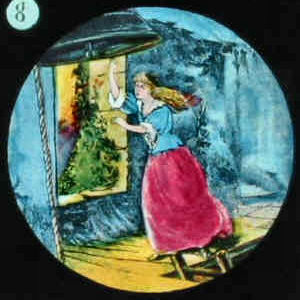 |
||||||
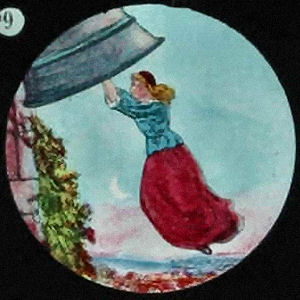 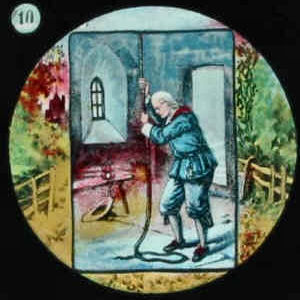 |
It was o'er, the bell
ceased swaying; and the maiden stepped once more Firmly on the damp old ladder, where, for hundred years before, Human foot had not been planted. The brave deed that she had done Should be told long ages after. As the rays of setting sun Light the sky with golden beauty, aged sires, with heads of white, Tell the children why the curfew did not ring that one sad night. |
||||||
|
O'er the distant hills
comes Cromwell. Bessie sees him; and her brow, Lately white with sickening horror, has no anxious traces now. At his feet she tells her story, shows her hands, all bruised and torn; And her sweet young face, still haggard, with the anguish it had worn, Touched his heart with sudden pity, lit his eyes with misty light. "Go! your lover lives," said Cromwell. "Curfew shall not ring tonight!" |
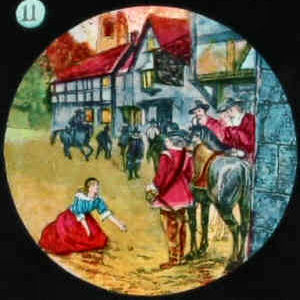 |
||||||
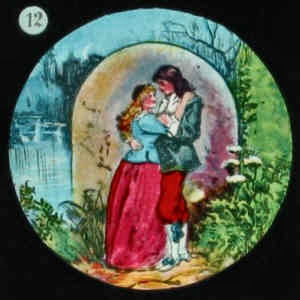 |
Wide they flung the
massive portals, led the prisoner forth to die, All his bright young life before him. Neath the darkening English sky, Bessie came, with flying footsteps, eyes aglow with lovelight sweet; Kneeling on the turf beside him, laid his pardon at his feet. In his brave, strong arms he clasped her, kissed the face upturned and white, Whispered, "Darling, you have saved me, curfew will not ring tonight." |
||||||
|
|
||
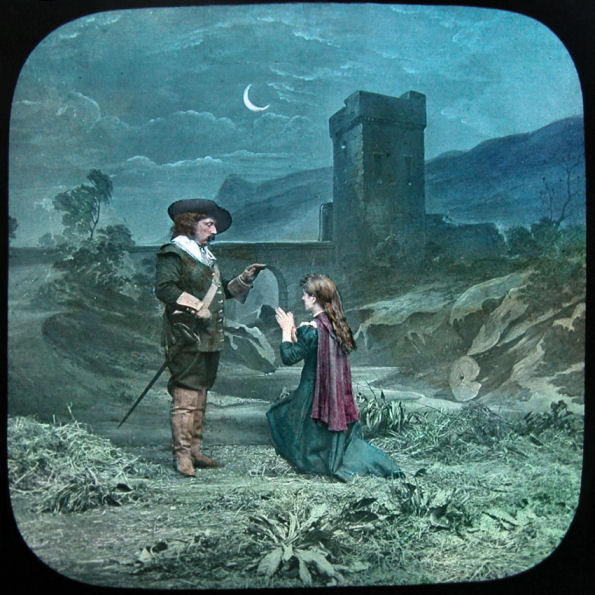 |
||
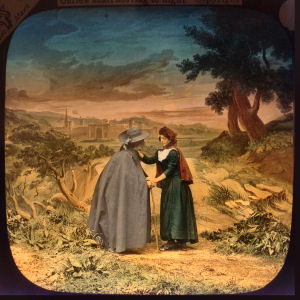 |
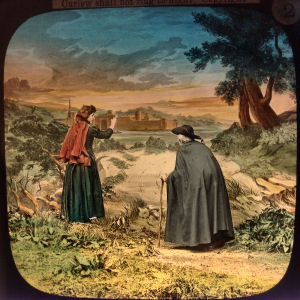 |
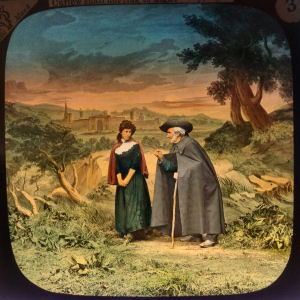 |
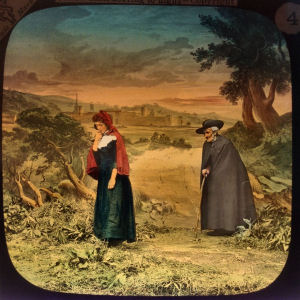 |
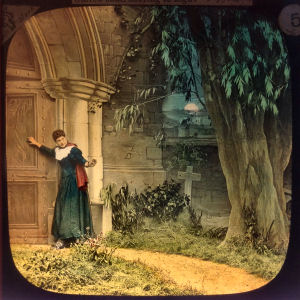 |
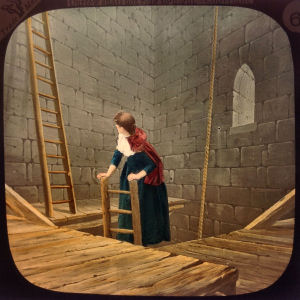 |
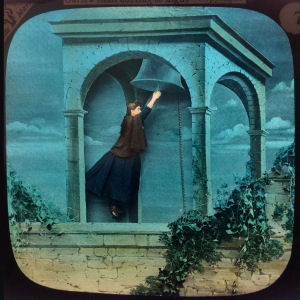 |
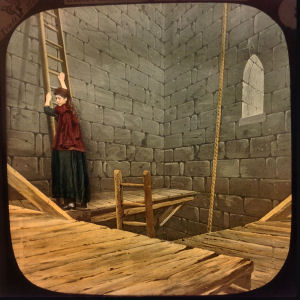 |
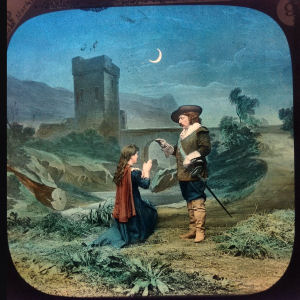 |
|
|
 Een
prachtige serie van tien lantaarnplaten getiteld 'Curfew shall not
ring tonight, gemaakt door de Engelse fabrikant York & Son. Vanaf 1890
gebruikte het bedrijf als handelsmerk een "Y" met een
ineengestrengelde slang, geplaatst in een driehoek. Een
prachtige serie van tien lantaarnplaten getiteld 'Curfew shall not
ring tonight, gemaakt door de Engelse fabrikant York & Son. Vanaf 1890
gebruikte het bedrijf als handelsmerk een "Y" met een
ineengestrengelde slang, geplaatst in een driehoek. |
|
|
Hoe zouden we dit korte overzicht van lantaarnplaten die
het verhaal "Curfew Must Not Right Tonight," illustreren beter kunnen afsluiten
dan met een van de meer dan 2.000 platen die werden getekend door de
onovertroffen Amerikaanse lantaarnplaten-artiest Joseph Boggs Beale. Beale was
een meester in het creŽren van platen die een verhaal vertelden en precies het
juiste dramatische moment weergaven. Hij besteedde ontzettend veel aandacht aan
de kleinste details. Beale was een van de weinige negentiende-eeuwse
artiesten die hun kunstwerken speciaal maakten om te worden gereproduceerd op
lantaarnplaten. Hij maakte zijn tekeningen helemaal in zwart/wit en grijstinten
en liet het aan de bedrijven die zijn werk uitgaven over de aparte
lantaarnplaten in te kleuren. Deze toverlantaarnplaat is een echt kunstwerk. De plaat heeft de Amerikaanse standaardafmetingen, 3.25" x 4" en is met de hand ingekleurd. |
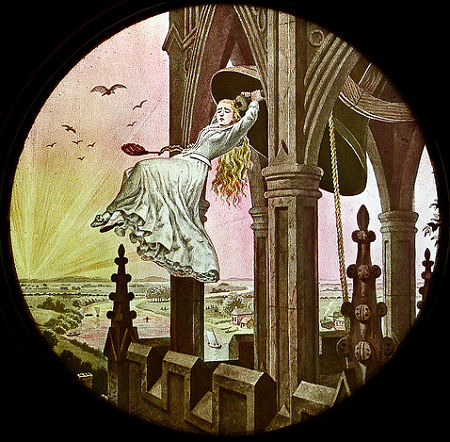 |
|
| |
©1997-2021 'de Luikerwaal' Alle rechten voorbehouden. Bijgewerkt tot 15-05-2021. |
